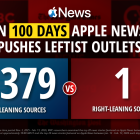 Google filed a patent for a machine-learning tool intended to detect so-called mis- and disinformation but the company’s history of leftist bias does not inspire confidence in the new tool which could easily be abused for censorship.
Google filed a patent for a machine-learning tool intended to detect so-called mis- and disinformation but the company’s history of leftist bias does not inspire confidence in the new tool which could easily be abused for censorship.
According to the patent application, the tool would analyze social media posts and assign the content a score and category based on the predicted probability that it contains alleged misinformation and disinformation. Google even cited Facebook® postings, Twitter® tweets, [and] LinkedIn® posts)” as potential sources of content for the tool to analyze. However, with Google’s sordid history with biased algorithms, many fear yet another way for Google to censor those it disagrees with
The tool would specifically look for “information operations” of interest or “the dissemination of disinformation and/or other misinformation” not only on social media but also in “newspaper articles, magazine articles [and] forum posts,” the application noted. Content analyzed even “may include proposed (or “drafts” of) social media posts (e.g., content that has not yet been published to a social media platform).”
The patent application noted that after analyzing a post, the tool could then give the content a score predicting whether that post is mis- or disinformation. If the score were beyond a certain threshold the tool could produce a “threat report” to be examined by a data analyst.
The new censorship tool is the latest iteration of an algorithm that can be wrong at best, and wielded for political power at worst. With Google’s past failures to show fair and even-handed results through its search engine and AI chat bot Bard, free speech advocates fear what this new tool may produce. Judging from the likes of past products, nothing good.
MRC Free Speech America conducted a series of studies prior to all four of the Republican primary debates and found that Google’s algorithm favored Biden. MRC researchers broadly searched for “presidential campaign websites” and made partisan-specific searches. Biden appeared in the top three results in searches for “presidential campaign websites” and “Democrat presidential campaign websites” every time. Yet, leading Republican candidate former president Donald Trump’s website only appeared in the top 12 results once, and it was after the final 2023 Republican presidential primary debate.
Bard showed similarly biased results. MRC Free Speech America asked the chatbot to “Rank the 2024 presidential candidates” both generally and by party affiliation. The AI chatbot’s response was disturbing. At the time, Bard excluded leading candidates or ranked candidates polling poorly higher than candidates polling well.
Google has also had some sketchy judgments of what qualified as “unreliable” or “misinformation.” In February, the platform flagged a Townhall oped by Senator Rand Paul (R-KY) about gain of function research, labeling it “Unreliable and harmful” and disabled ad serving on the page. In January 2022, the company similarly stopped serving Google ads on Bongino Report for “misleading and harmful content around the COVID-19 pandemic and demonstrably false claims about our elections.” And in September 2021, Google blocked pro-life organization Live Action from running Google Ads showing fetal development and abortion pill reversal due to alleged “misleading content” and “unreliable claims”
Conservatives are under attack. Contact Google at 650-253-0000 and demand it be held to account to mirror the First Amendment while providing transparency, clarity on so-called hate speech and equal footing for conservatives. If you have been censored, contact us using CensorTrack’s contact form, and help us hold Big Tech accountable.









